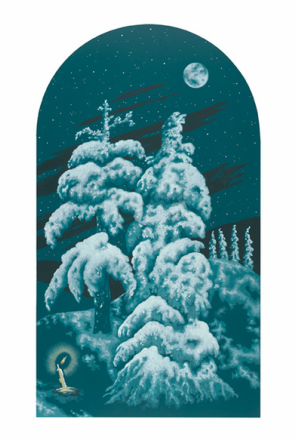 I vividly remember writing an essay in high school as part of a final exam on the short poem by Robert Frost, Stopping by Woods on a Snowy Evening. Our teacher used this early, short poem of Frost to teach us a valuable lesson: an awareness or type of hearing, if you will, of what was between and even beyond the words. The poem, fittingly, is about listening, and in the simple text I can almost hear the falling snowflakes alighting on the leaves of the trees, see the surrounding darkness of the woods, and feel the cold of the winter’s night. I have always admired poets who can put words together so skillfully that they sing with meaning or have the ability to burrow deep into the soul. As artfully as words can be spun, I especially value the power of words when I do not have them myself, such as at this moment when I literally cannot speak due to a case of laryngitis. There is a hidden gift in this temporary ‘affliction.’ It is that I must listen more carefully since I cannot do otherwise. As you might have guessed, this reflection is on the gift and art of listening. It is also about how communication is not really about words, but rather about deeper realities. And sometimes it is about learning to use other senses in order to hear and respond to God. Having little ability to speak necessitates finding alternate ways of communicating. It means becoming creative in conveying meaning in some way that does not require spoken words. It also forces me to listen more intently to those around me and it provides an opportunity to listen more deeply to God since the distraction to focus on self which I can create with my own voice is no longer available. It offers an atmosphere of other-centeredness, especially when focusing on God; it also fosters gratitude for the gift of speech, suddenly recognized because of its absence. But the real challenge is that just as one does with a piece of poetry, being temporarily silent means having to learn to ‘hear’ beyond and between the words, since I can do little to fill the space. Another way to express this is that being silent is a reminder that we all need to find ways of being attuned to God since we know that ordinarily when God speaks it is not with words that we hear with our physical ears, but rather it is something to which all our senses must be applied. Being silenced helps us to discern His presence in the world around us and within our own hearts.  God our Creator has communicated with His people throughout salvation history. Those who were attentive to God’s inspiration provided us with the written Word of God, the Bible, and so we can prayerfully open ourselves to the wisdom God tried to impart to His people during their struggle to be faithful to Him by reading the various books within it and doing some serious study. He sent us Jesus as His spoken Word (John 1:1) that we might know the great beauty of His love and mercy which are extended to us. We should ponder the message of Jesus in the gospels, learn how to discern the movements of the Holy Spirit, or find something about the way God does justice with mercy so that we know the way to proceed in difficult situations. But God also communicates beyond words through that which He has created. St. Hildegard of Bingen expressed this in her teaching about viriditas, which is the lushness or greenness of creation, a reference to the power of God’s presence which enlivens all things with life and light. For Hildegard, viriditas included the life-giving and healing power found in various plants, that the written word, (sung or spoken) evokes emotions and images, and that each person is also a reflection of God’s own beauty. She wrote: “Every creature is a glittering, glistening mirror of Divinity.” This is how God intends us to see ourselves, because this is how He sees us. But if we have never received this message we might lack respect for ourselves which could then translate into a lack of respect for others. It would be good for us to allow the words of St. Hildegard to resonate within us so that we can hear God speak His love and mercy deep within our own hearts, healing whatever distorted beliefs we might harbor in regard to ourselves and also the ones we may extend toward others. God sees us as a reflection of Himself, and the only way to begin the path to wholeness (holiness) is to take Him at His word.  In all relationships communication is the ‘tool’ we use to reveal our identity to one another. Therefore, prayer is a large part of the intimate relationship which God desires to maintain with us. Prayer is not simply a litany of words, requests, or desires, but it is a dialogue, which means we need to learn how to observe the presence of God within and around us, so we can be open to His response. If we do not learn to let Him ‘get a word in edgewise,’ then we are not fully engaged in communicating with Him. Vocal prayer (saying traditional or rote prayers) is an important part of our communication with God, and so is intercessory prayer, but another essential part of our prayer time which should not be neglected is the time we spend in meditation, allowing Him to move our hearts and open our spiritual eyes and ears. It is in this time that we invite God into dialogue, or perhaps spend time simply sitting with Him. People of prayer, and not only of prayers, are people who know how to listen. In our listening we become humble, having put God before our needs and wants, and in doing so, we grow in holiness. If we learn to listen and observe, we can discover the deeper realities which go beyond words that He wants to reveal, messages of His love and mercy for us. In being silent before God we are freed to become imitators. One cannot imitate someone to whom we do not really give full attention. If we truly desire to become holy, to mirror God, we need to open our ears to Him. Being silent is not always about becoming passive, though this is appropriate at certain times. However, when we are listening to another person, being silent is actually a type of activity: we need to actively listen, that is, to put effort into hearing what it is the other is conveying. We communicate our caring by laboring to be truly present to them. There are times when we know our words will fall short, so we simply are with the other, unchaining them from the burden of aloneness. Also, we have heard the adage that ‘silence speaks louder than words:’ there are situations in which keeping quiet about something is the greater good, and there are other times in which speaking up is necessary. But in order to know which is which, we need to first be silent, praying for wisdom. Then if we are to speak, we need the continued wisdom to know what to say. Sometimes the Lord is asking us to quietly get out of the way and let Him do what only He can do or reveal something only He can reveal. And when difficult things do need to be said, if they are said with love, no matter how challenging the situation may be, we are to say them. If we remember that love is always the intention of the follower of Jesus, then we will know what to do and whether the time is right to act.  Listening is an art, and as an art it needs to be practiced. And like any other art form, listening can become a beautiful gift we offer the world. While not all of us will be able to express what we hear by writing gorgeous poetry, we can become a poem through our presence and our little deeds of love. And while not all of us can create masterful paintings, (or works of any other artistic medium), we can all learn, as St. Hildegard suggests, how to see that “every creature is a glittering, glistening mirror of Divinity.” If we learn to see and respond in this way, to come to recognize the priceless work of art which God has created each one to be, (Ephesians 2:10) we will come to be accept that we, too, are a mirror of Divinity as one of God’s holy people. It is a process, and it is something to which we are all called. Let us learn to practice silence, not only when sickness forces us, but on a daily basis, so that we might learn to perceive the Word, Jesus, who is with us at every moment. May we be open to learning the art of listening! May we trust that God listens to us when we pray, and may we be accepting of His response! May we begin to see Divinity mirrored in every creature, including ourselves! May we use our words and deeds to communicate peace, healing and love, but also have the courage to speak difficult truths if we are called to do so! And may we discover God the Father, Jesus the Son, and the Holy Spirit mirrored to us, and indeed present to us, through creation and in the artistry of our brothers and sisters! Let us meet in the Heart of Jesus! Peace! ©Michele L. Catanese The text of Robert Frost’s poem, Stopping by Woods on a Snowy Evening can be found at http://www.poetryfoundation.org/poems-and-poets/poems/detail/42891 The first image is a painting by Fr. William Hart McNichols which is part of a triptych which was commissioned by a funeral home in Taos, New Mexico. It is called Tree Triptych for Rivera Funeral Home. I chose this work because is seemed to speak of the solitude which Robert Frost was describing in the poem. Honestly, I love every icon or image that Fr. Bill paints which has stars and the moon in it. His renderings of the night sky are always meditation points for me, no matter what else is in the icon or image. There is always a sense of peace evoked in his night skies. But what I love most about this image, however, is the small candle in the bottom left hand corner. It speaks to me of hope and of Christ who is the Light which dispels all darkness. The wind seems to be trying to blow out this flame, but the flame prevails, as does Jesus. To view the entire work, and to see the other two trees which appear with this one in the triptych go to http://fineartamerica.com/featured/tree-triptych-for-rivera-funeral-home-220-william-hart-mcnichols.html. Next is The Creation of the World by Guisto Menabuoi, an Italian painter from the Florentine school. (1320-1391) I chose it because it reminded me of the beginning of Genesis in which God spoke "Let there be..." and things came into being. It was the word of God which created, breaking the silence of eternity. It also made me think of viriditas, the lushness and bounty of creation, all of which is charged with the presence of God, the life-giving Creator, the Artist of all Artists. You can find more on this work at http://www.fineart-china.com/htmlimg/image-51701.html. By the way, if you look closely you can see layers of golden light, earth-colored brown, and green (viriditas?) surrounding the orb which seems to represent the earth. Third, is a mural which shows St. Hildegard of Bingen sitting on what seems to be a throne, maybe the throne of wisdom and truth, though most likely a reference to her position as abbess in her community. (The inscription under it states that she is a prophet, actually). She is seen to be writing, something she did quite prodigiously. Maybe she was writing about viriditas, or perhaps the quote found in this entry. This wall mural is in the church at St. Hildegard Abbey at Rudesheim am Rhein in Germany. (Fr. Bill McNichols also has some wonderful icons of St. Hildegard which do not appear in this piece, but you can find them at http://fineartamerica.com/profiles/william-hart-mcnichols.html?tab=artworkgalleries&artworkgalleryid=576462 and http://fineartamerica.com/featured/st-hildegard-of-bingen-171-william-hart-mcnichols.html.) Finally the last image is one of my own photos taken at Crater Lake, Oregon. I chose this because of the stillness of the water. There was a profound silence in this spot except for the faint sound of the gentle breeze. Because there are no currents in this lake which literally fills up a volcanic crater, the image of the mountains and clouds are mirrored perfectly. If you look really closely, on the left side of the photo you can see a cloud which seems to be floating on the water just above the tree tops: it is a mirror image of the actual cloud in the sky directly overhead. Indeed, all of creation is "a glittering, glistening mirror of Divinity!" Comments are closed.
|
Heart Speaks to Heart
|

 RSS Feed
RSS Feed

